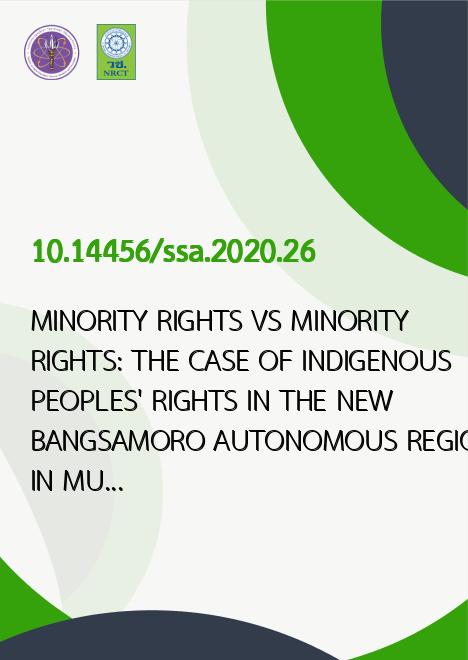
|
MINORITY RIGHTS VS. MINORITY RIGHTS: THE CASE OF INDIGENOUS PEOPLES' RIGHTS IN THE NEW BANGSAMORO AUTONOMOUS REGION IN MUSLIM MINDANAO |
|---|---|
| รหัสดีโอไอ | |
| Creator | Dennis Quilala |
| Title | MINORITY RIGHTS VS. MINORITY RIGHTS: THE CASE OF INDIGENOUS PEOPLES' RIGHTS IN THE NEW BANGSAMORO AUTONOMOUS REGION IN MUSLIM MINDANAO |
| Publisher | National Research Council of Thailand |
| Publication Year | 2563 |
| Journal Title | SOCIAL SCIENCE ASIA : Official Journal of National Research Council of Thailand in conjunction with Journal of Politics and Governance |
| Journal Vol. | 6 |
| Journal No. | 4 |
| Page no. | 21-37 |
| Keyword | Peace Process, Institutions, Second-Order Minorities, Lumad, Moro |
| URL Website | http://e-journal.nrct.go.th/ |
| Website title | e-journal |
| ISSN | 2229-2608 |
| Abstract | The Philippine government concluded the peace process with the Moro Islamic Liberation Front with the passage of the Organic Law for the Bangsamoro AutonomousRegion in Muslim Mindanao. Many issues plagued the process but one of the more important issues is the fear that the indigenous groups in the autonomous region would be further marginalized. History tells of many stories of discrimination of lumads and with their leaders kept from having a seat in the negotiating tables, they are bracing for the worst. It is argued in this paper that an institutional approach to the issue would indicate that the rights of the lumads will not only be recognized but also protected. There are three reasons why institutions will continue to protect the rights of the lumads. Firstly, the peace process is not limited to the peace negotiations. There are various avenues in which lumad issues could be promoted. Secondly, there is evidence that the legislative process has not only protected the rights of the lumads, it has even enhanced the provisions on lumad protection in the Organic Law for the Bangsamoro Autonomous Region in Muslim Mindanao. Lastly, even if the peace negotiators have deliberately ignored the pleas of the lumads, the 1987 Philippine Constitution and other institutions would continue to protect their guaranteed rights as citizens and as members of indigenous groups in the Philippines. |